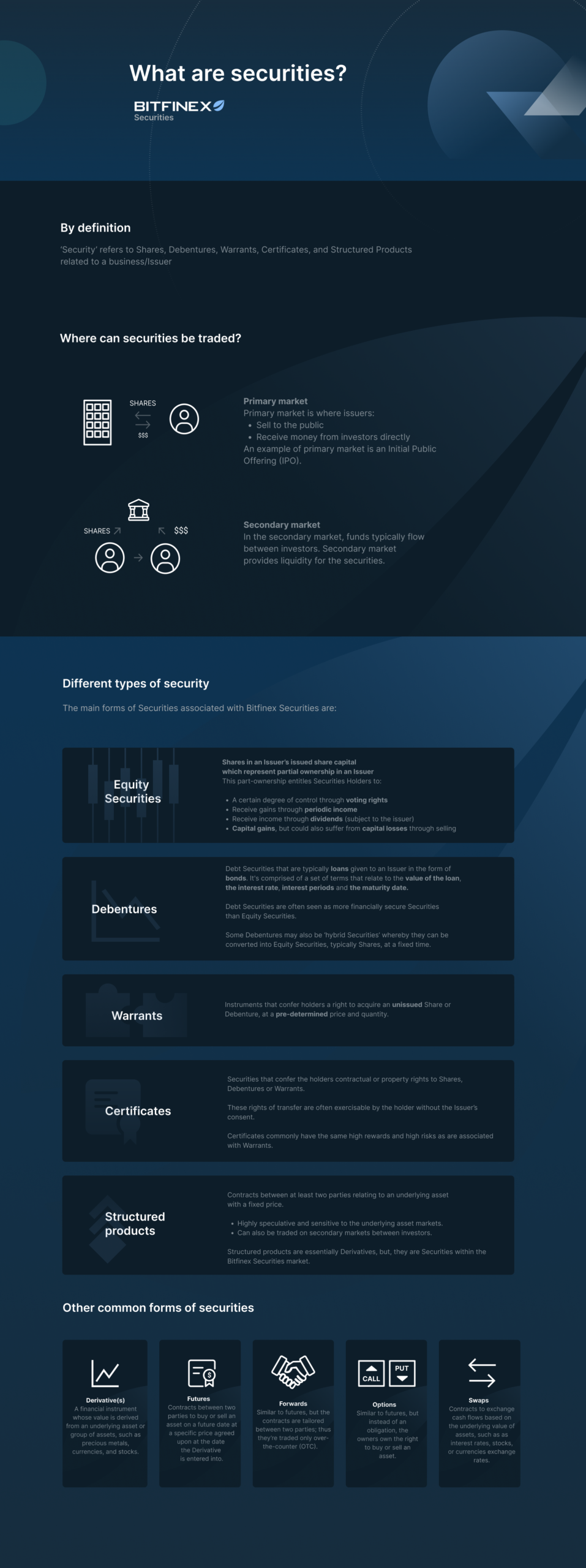
18 Jan What are Securities?
‘Security’ refers to Shares, Debentures, Warrants, Certificates, and Structured Products in relation to a business or an Issuer that are liquid and tradeable financial assets on primary and secondary markets. Primary market trading includes IPOs, whereby Issuers issue Securities to investors directly in exchange for funding. Securities may also be traded between investors within the secondary market that does not provide funding to the Issuer. This secondary market provides liquidity for Securities.
Different types of security
The main forms of Securities associated with Bitfinex Securities are:
- Equity Securities
Most commonly, Equity Securities are Shares in an Issuer’s issued share capital which represent partial ownership in an Issuer. This part-ownership entitles Securities Holders to a certain degree of control through the form of voting rights. Equity Securities also allow their Securities Holders to receive gains through periodic income, as well as capital gains.
Securities Holders often, but do not necessarily, receive income through the form of dividends throughout the Issuer’s financial year. Whether or not dividends are paid out, and the frequency of pay-outs, will vary from Issuer to Issuer.
Securities Holders may also make capital gains when they sell their Equity Securities, if the value of the Equity Security has increased in favourable market conditions since the Equity Security was purchased. However, capital gains are not guaranteed and depend upon general market conditions, as well as Issuer-specific factors which may reduce the value of Equity Securities. Moreover, if the Issuer has become bankrupt or entered into administration, Securities Holders will often receive a significantly lower value and suffer capital losses.
The maximum capital losses that a Securities Holders may suffer is the original capital paid for the Equity Security. No further capital losses can be suffered by Securities Holders unless further Securities are purchased.
- Debentures
Debentures are Debt Securities that are typically loans given to an Issuer in the form of bonds. This Debt Security will be comprised of a set of terms that relate to the value of the loan, the interest rate, interest periods and the maturity date.
The interest periods within the Debenture entitle the Securities Holder to an interest payment, and any number of interest payments, on, or within, a set period. The value and frequency of interest payments will be determined before the Debenture is issued and are typically unable to be changed before the maturity date.
Debentures also allow the Securities Holder to recover the original capital that is paid to the Issuer as part of the Debt. This capital will also be recoverable on set dates or at set periods, within a fixed term, as is set out in the Debt Security.
Debentures may also be traded on capital markets and may have fluctuating market values, allowing the Securities Holder to recover their capital earlier than the fixed term of the Debt Security. Regardless of this, Debt Security continues to exist and the new Debt Securities Holder will now be the party to receive the interest payments from the Issuer and receive the capital upon the maturity date. Some Debentures may also be ‘hybrid Securities’ whereby they can be converted into Equity Securities, typically Shares, at a fixed time.
Debt Securities are often seen as more financially secure Securities than Equity Securities. This is because the income in the form of interest payments is contractually required, whereas the payment of dividends in relation to Equity Securities is often discretionary. Moreover, the capital paid by the Securities Holder to the Issuer at the beginning of the loan is also recoverable under a contract, whereas in relation to Equity Securities, there is no guarantee that the capital paid to the Issuer will be recovered.
- Warrants
Warrants are instruments that confer on the Securities Holder a right entitling them to acquire an unissued Share or Debenture, often at a pre-determined price, quantity and at a time that is either at the Securities Holder’s discretion or at a fixed date.
The potential capital gains may be immediate for Security Holders of Warranties as the purchase price of the Warrant may be substantially lower than the market value of an Issuer’s Shares, resulting in immediate gains. However, these high rewards are contrasted with the high risks of the opposite scenario occurring, whereby Warrants are exercised where the purchase price of the Shares is higher than the market price, leading to losses, or rendering the Warrant un-exercisable.
- Certificates
Certificates are Securities that confer on Securities Holders contractual or property rights to or in respect of Shares, Debentures or Warrants, excluding rights under Options, issued by the Issuer that Securities Holder holds Securities within. These rights of transfer are often exercisable by the Securities Holder without the Issuer’s consent. They commonly have the same high rewards and high risks as are associated with Warrants.
- Structured products
Structured Products are issued by Issuers and are essentially Derivatives, which are further set out below. However, within the Bitfinex Securities market, Structured Products are Securities, whereas Derivatives are not.
Structured Products are contracts between at least two parties relating to an underlying asset, whereby the price of the underlying asset is fixed, meaning that if the market value of the asset is different to the fixed contract rate, one party will receive a gain and the other a loss.
On the maturity date of the Structured Product, the underlying contract is activated and fluctuating market prices of underlying assets are analysed in order to determine which party to a contract has made a gain or a loss. The difference between the contract rate and the market rate is settled with cash and payable to whichever party has enjoyed a gain.
These products are highly speculative and sensitive to the underlying asset markets. These products can also be traded on secondary markets between investors.

Other common forms of securities
- Derivative(s)
A derivative is a financial instrument whose value is derived from an underlying asset or group of assets. Some assets from which a derivative often derives its value are commodities, such as gas or precious metals, currencies, bonds, stocks, and interest rates. Derivatives can be traded on an exchange, but mostly over-the-counter (OTC).
- Futures
Futures are contracts between two parties to buy or sell an asset on a future date at a specific price agreed upon at the date the Derivative is entered into.
- Forwards
Forwards are similar to futures, but the contracts are tailored between two parties; thus are traded only over-the-counter (OTC).
- Options
Options are contracts similar to futures, but instead of an obligation, the Securities Holders own the right to buy or sell an asset. For example, in a call option, the Securities Holder has the right to buy the asset, whereas, in a put option, the Securities Holder has the right to sell the asset.
- Swaps
Swaps are contracts to exchange cash flows based on the underlying value of assets, such as interest rates, stocks, or currencies exchange rates.
Whichever form of Security that an Issuer decides to issue to investors will likely depend on the circumstances of the Issuer, its needs and the market generally. Nevertheless, it is highly likely that at any one point an Issuer will have issued and in circulation a wide range of Securities and a variety of forms of Securities.



